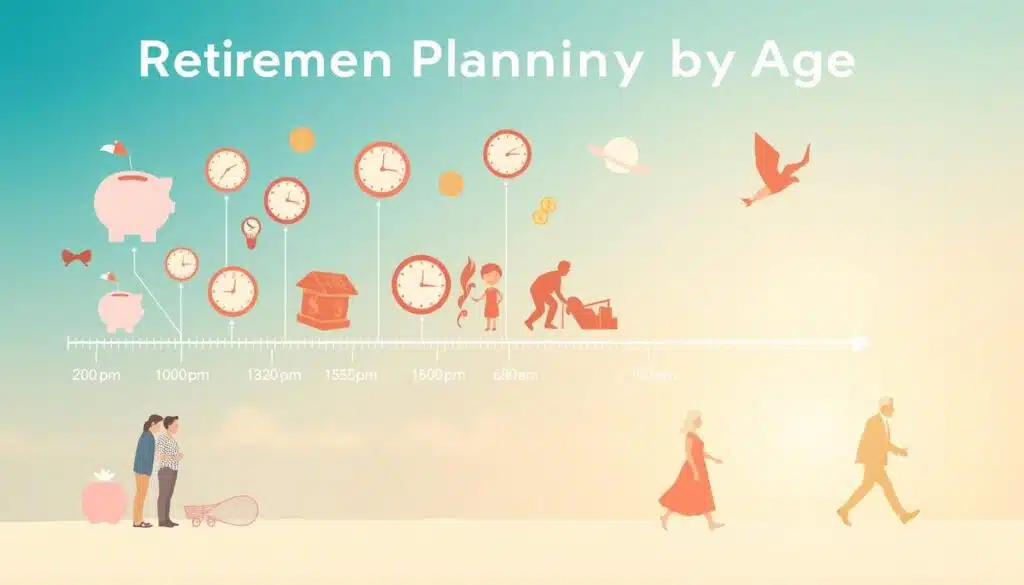Retirement Planning Tips is key to a comfortable future. It means setting financial goals, knowing your income sources, and making smart choices about saving and investing. Starting early lets compound interest help you.
Also Read: How To Find The Right Debt Relief Option For You?
Think about your lifestyle, income, and dreams for the future when planning. Keep up with new trends in retirement planning. Also, update your plan as your life changes.
Key Takeaways
- Understand the importance of retirement planning for long-term financial security
- Set clear financial goals and review them regularly to stay on track
- Leverage the power of compound interest by starting retirement planning early
- Explore various income sources, including pensions, investments, and supplementary earnings
- Seek professional advice to optimise your retirement planning strategy
Why Early Retirement Planning is Essential
Planning for retirement is key to a secure financial future. It’s vital to start early to use compound interest and reach your financial goals. A solid financial foundation now means a worry-free retirement later.
Also Read: Essential Student Loan Advice For Graduates
Understanding the Power of Compound Interest
Compound interest is crucial for growing your retirement savings. Saving and investing early lets your money grow faster. Even small, regular savings can make a big difference in your retirement fund.
Setting Realistic Financial Goals
To plan well for retirement, set realistic financial goals based on your lifestyle and income. Think about inflation, healthcare costs, and life expectancy. Realistic targets help create a retirement plan that meets your needs.
Building a Strong Financial Foundation
Building a secure retirement starts with a strong financial foundation. This means paying off debts, boosting pension contributions, and diversifying investments. Regularly check and tweak your retirement plan to stay on track.
Starting early retirement planning is crucial for a secure future. By grasping compound interest, setting realistic goals, and building a solid financial base, you can control your retirement. This brings peace of mind and a secure future.
Also Read: Simple Tips For Credit Score Improvement
“Compound interest is the eighth wonder of the world. He who understands it, earns it; he who doesn’t, pays it.” – Albert Einstein
Maximising Your Workplace Pension Benefits
Your workplace pension is a great way to secure your retirement. By understanding and optimising your pension, you can increase your savings. This will help improve your financial future.
One big plus of a workplace pension is the employer contribution. Many employers will match your contributions up to a certain percentage. This means your savings can double. So, make sure to contribute enough to get the full employer match.
Auto-enrolment makes it easy to start saving for retirement. But, the minimum contributions might not be enough for your goals. Think about increasing your contributions beyond the auto-enrolment minimum to grow your pension.
It’s important to regularly check how your workplace pension is doing. Look at the investment options, fees, and risk level to make sure it fits your retirement plans and risk comfort. If you need help, don’t be afraid to ask for professional advice.
Keeping up with changes in your workplace pension is also key. Stay informed about any changes that could affect your retirement savings and adjust as needed.
By actively managing your workplace pension, you can make the most of it. Remember, every contribution you make matters. Even small changes now can make a big difference in your future finances.
Also Read: How To Start Budgeting For Beginners?
“The Pension Tracing Service searches a database of more than 200,000 pension schemes to help individuals track down old workplace pensions.”
Retirement Planning Tips: Creating Your Investment Strategy

Creating a solid investment plan is key for a secure retirement. Diversifying your investments across different types can help manage risks and increase returns over time. Also, looking into tax-efficient investing can boost your retirement savings.
Diversifying Your Investment Portfolio
Diversification is a core investing principle. By investing in various assets like stocks, bonds, real estate, and alternatives, you can reduce the impact of market ups and downs. Aim for a balanced portfolio that fits your risk level and retirement timeline.
Also Read: Unlocking University Research Opportunities For Your Career
Managing Investment Risk Over Time
As retirement nears, it’s wise to make your investments more cautious. Experts recommend moving from a bold investment strategy in your youth to a safer one as you get older. This can safeguard your savings from market drops.
Tax-Efficient Investment Options
| Investment Option | Key Benefit |
|---|---|
| Individual Savings Account (ISA) | Tax-free growth and withdrawals |
| Self-Invested Personal Pension (SIPP) | Tax-deferred contributions and growth |
| Taxable Brokerage Account | Immediate access to funds, but with upfront tax payments |
Using tax-efficient investments like ISAs and SIPPs can grow your retirement savings and lower your taxes. Choose the right option based on your financial situation and goals.
Your investment plan should change with your life and retirement goals. Regularly check and adjust your portfolio to match your risk level and financial aims.
Understanding Your Retirement Income Sources

As you get closer to retirement, knowing your income sources is key. These include the State Pension, workplace pensions, private pensions, savings, investments, and part-time work.
First, use the Pension Tracing Service to find any forgotten pensions. Combining these can simplify managing your retirement funds. After finding all your pensions, use online tools to estimate your retirement income. This helps you see if it matches your expected costs.
If your retirement income looks short, you have options. You could delay retirement, downsize, or find part-time work. These steps can help boost your retirement savings or adjust your plans.
Maximising Your Retirement Income
To have a comfortable retirement, try these strategies:
- Make the most of tax-efficient pension contributions and investment options to grow your savings
- Check your State Pension and think about deferring it if it fits your plans
- Look into workplace pensions and employer contributions to increase your savings
- Spread your investment portfolio to reduce risks and aim for better returns
- Think about adding to your income with part-time work or rental income from a property
Regularly reviewing and tweaking your retirement plans is crucial. It ensures a secure and enjoyable retirement.
“The key to a successful retirement is having a clear understanding of your income sources and expenses, and planning accordingly.”
Age-Specific Retirement Planning Strategies

Planning for retirement needs a plan that changes as you get older. Whether you’re in your 30s, 40s, or 50s, the right strategies can secure your future. It’s all about making smart choices for your money.
Planning in Your 30s and 40s
In your prime years, focus on boosting your pension and paying off debts. Max out your workplace pension and add more than the minimum. This way, you can use compound interest to your advantage. Also, think about investing in riskier options to grow your savings.
Planning in Your 50s and Beyond
When you’re closer to retirement, check your pension goals and how your funds are doing. Look to increase your State Pension, which is about £11,500 a year now. Remember, you’ll need to wait until 57 to access your personal pension in 2028, so plan ahead.
Transitioning to Retirement
As retirement gets closer, plan how you’ll make the transition. Think about your ideal retirement date and what you want to do. Look into flexible retirement options to ease into this new phase. Get advice from a financial expert to manage your pension and income well.
| Age Range | Key Retirement Planning Strategies |
|---|---|
| 30s and 40s |
|
| 50s and Beyond |
|
| Approaching Retirement |
|
By planning for retirement based on your age, you can take steps towards a secure retirement. Whether you’re starting your career or nearing retirement, informed decisions are key. This way, you can achieve your retirement planning by age, mid-life financial planning, and pre-retirement strategies.
Managing and Protecting Your Retirement Savings

Keeping your retirement savings safe is key to a secure future. Be careful of pension scams and only trust authorised financial advisers. Always check your pension statements and investment performance to stay on track.
It’s also important to protect your pension assets. Choose beneficiaries for your pension’s death benefits to ensure your wishes are followed. Include your pension in your estate planning to make sure your wealth goes to your loved ones smoothly.
Inflation can reduce the value of your savings over time. Get financial advice to understand how to protect your retirement savings. A good strategy can help your savings keep up with inflation.
| Estimated Annual Retirement Costs | Amount |
|---|---|
| Basic living costs | £14,400 |
| Essential and moderate lifestyle expenses for a single retired person | £14,857.50 |
| Essential and moderate lifestyle expenses for a retired couple | £22,400 |
| 14-night half board holiday in Europe | £2,025 |
| Running cost for a 3-year-old small car (replaced every 5 years) | £4,814 |
| Gifts, charitable donations, and support for family members | £3,200 |
| Engaging in two leisure activities a week | £2,080 |
| Weekly dining out and taking others out for a meal | £3,380 |
| Personal shopping trips | £870 |
| Home improvements | £800 |
Getting financial advice is vital for complex financial decisions. It helps protect your retirement savings.
Also Read: How To Manage Your Money: Essential Personal Finance Tips
Creating a Sustainable Withdrawal Strategy
Creating a plan for sustainable withdrawals is key to making your retirement savings last. You can use tax-efficient methods and balance immediate needs with growth potential. This way, your plan can adjust to market changes and personal needs.
Tax-Efficient Withdrawal Methods
It’s important to make your retirement withdrawals as tax-efficient as possible. Use your tax-free cash allowance wisely and look into other tax-efficient options. Getting advice from professionals can help you reduce taxes and still get the income you need.
Balancing Income and Growth
It’s a challenge to balance your need for income now and the chance for your investments to grow. A flexible spending plan can adjust based on how your investments do. This way, you can keep your retirement savings working for you as your needs change.
Adjusting for Market Conditions
Your plan should change with the market and economic conditions. If the market is volatile or interest rates are low, you might need to slow down your withdrawals. Regularly reviewing and updating your plan helps you stay secure financially, even when the market is unpredictable.
FAQs
Q: What should I consider when I plan for retirement?
A: When you plan for retirement, you need to consider your retirement age, how much you might need in retirement, your living standards, and your potential retirement options. It’s crucial to work out how much income you will need to maintain your desired lifestyle.
Q: How do I work out how much money I might need in retirement?
A: To work out how much money you might need in retirement, consider your expected living expenses, healthcare costs, and any debt repayments. Additionally, think about the lifestyle you want to maintain and include any travel or leisure activities.
Q: At what age should I start planning for my retirement?
A: It’s never too early to start planning for your retirement. Ideally, you should begin planning in your 20s or 30s. However, even if you are approaching retirement age, it’s still beneficial to start planning as soon as possible to maximize your pension pot and retirement savings.
Q: What are my retirement options when I reach state pension age?
A: Upon reaching state pension age, you can choose to take your state pension, withdraw money from your pension pot, or continue working. You might also consider flexible retirement income options such as annuities or drawdown plans to supplement your income.
Q: How can I calculate the amount I need to save for my pension pot?
A: To calculate the amount you need to save for your pension pot, you can use online retirement calculators or consult a financial advisor. They can help you work out how much you need to save each month based on your desired retirement date and lifestyle.
Q: What is the benefit of having a defined contribution pension plan?
A: A defined contribution pension plan allows you to build a pension pot that is invested over time. The benefit is that your retirement income can grow based on investment performance, and you have more control over how your funds are managed compared to other pension types.
Q: Is it too late to start planning for my retirement if I’m over 50?
A: It is never too late to start planning for your retirement, even if you are over 50. While you may have less time to save, you can still make significant changes to your retirement plan and increase your pension pot through additional savings and investment choices.
Q: What is Pension Wise, and how can it help me?
A: Pension Wise is a free and impartial guidance service that helps individuals understand their retirement options. It can provide you with information on how to manage your pension pot, how to take money from your pension, and what your income for life might look like.
Q: How can I ensure that my retirement lifestyle meets my expectations?
A: To ensure your retirement lifestyle meets your expectations, start by clearly defining your retirement goals and desired living standards. Regularly review your pension plan, investment choices, and savings strategy to stay on track and adjust as necessary.
Source Links
- https://www.unbiased.co.uk/discover/pensions-retirement/planning-for-retirement/how-to-plan-for-your-retirement
- https://frazerjames.co.uk/best-retirement-advice-how-to-plan-for-retirement/
- https://www.covenantwealthadvisors.com/post/9-reasons-why-retirement-planning-is-important
- https://www.investopedia.com/terms/r/retirement-planning.asp
- https://www.aegon.co.uk/customer/learn/guides/your-workplace-pension/tips-to-make-the-most-of-your-workplace-pension
- https://retirement.fidelity.co.uk/grow-and-manage-your-pension/maximise-contributions/
- https://www.ishares.com/us/education/prepare-for-retirement
- https://www.nerdwallet.com/article/investing/retirement-planning-an-introduction
- https://www.ryans-uk.com/retirement-budgeting-your-essential-guide/
- https://www.nfumutual.co.uk/news-and-stories/7-tips-to-help-get-the-best-income-in-your-retirement/
- https://sevenaar.co.uk/insights/retirementstrategies
- https://www.phoenixlife.co.uk/planning-your-future/how-to-plan-for-retirement-in-the-uk
- https://www.standardlife.co.uk/articles/article-page/planning-for-retirement
- https://www.hilltopfinance.co.uk/pension-advice/retirement-planning/understanding-retirement-planning-a-guide-for-ages-40-55/
- https://www.standardlife.co.uk/retirement/guides/saving-for-retirement
- https://frazerjames.co.uk/the-basics-of-early-retirement-a-comprehensive-guide/
- https://investor.vanguard.com/investor-resources-education/article/retirement-withdrawal-strategies
- https://adviserservices.fidelity.co.uk/media/fnw/guides/sustainable-withdrawal-rates-for-drawdown-clients.pdf
- https://docs.rbcwealthmanagement.com/us/68276-sustainable-withdrawal-rates-in-retirement.pdf









